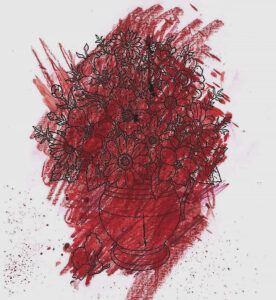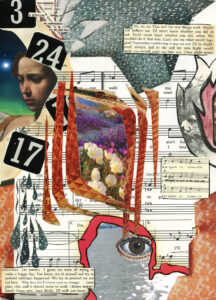Twenty-One Beginnings for the Same Short Story
by Eric Dovigi
1. The west window of Dandelion Manor—for in all the entire west wall there was only a single round window, small, and close to the top—was bright with the pale pressed faces of children, peering down into the parking lot at the mailman, who, unable to hear their cries for help, was whistling his way back to the bicycle on the curb of the long driveway.
2. Maybe it was the odor of rotting peaches in the wicker bowl on the kitchen countertop, or maybe it was the ziggurat of unwelcomed newspaper-rolls heaped in the driveway, or maybe the starved body of the little terrier lying prostrate under the scratch-marked legs of a table bearing a full bag of dog food, or it could have been only the latent and unshakable tendency to consider the worst outcome of any given situation the most likely—but whatever it was, something made Investigator Wainwright-Perkins wonder if maybe it had been a mistake to put off checking on Mrs. Jenkins (widely considered the oldest widow north of the Mason-Dixon) until now.
3. A bicycle stood by some dandelions. Tiny purple bulbs blew past in the wind. Groundwater leaked between the dandelions. Anne Jenkins, the youngest widow in New York, took off her shoes and began to walk toward the ocean. The sun climbed up in front of her; behind a mist rising from the water it was an observable pale disc.
4. “Blood will be a thing of the past!” cried the Doctor. “Heights will be made low! Lows will be made mountainous! Skin will be titanium. Stone, brazen. Brass, steel. Steel: sheer diamond. I have found the elixir. I have made the stone. I’ve cut straight to the quick of life. I’ve distilled ambrosia. I’ve boiled myself a bit of immortality.
“And the crux of it is, Mrs. Jenkins: I’m willing to share. But, I must have your answer now: for I am bound for Florida come morning. Come morning, Mrs. Jenkins.”
5. Meg wondered if the mailmen budded their newspapers, like some kind of wayward sporing fungi, and obsessively wandered the Earth looking for suitable places to deposit them. Either way, they must have been driven by some blind force of instinct, caring for nothing else, for not a single one of the many mailmen and mailwomen that had serviced them over the recent years had ever acknowledged the cries for help Meg was certain could be heard from the front door—and for which she paid so dearly.
6. Many years later, when asked why her wrists were so thin around, Meg would answer that she hadn’t been good at finding food during her feral years.
7. “Oh no,” said Danica Jenkins, watching the bathwater trickle down the steps into a pool at the bottom landing. “Mom’s finally decoded the text.”
8. The Medicine Man had left nothing but a receipt written on a napkin, and a large sheet of paper bearing a vaguely Latin-looking cypher with a crude, unhelpful diagram of a bathtub on the reverse side. Mrs. Jenkins had promptly taken the cypher into the library, and the only consequent sunlight she got over the next few months were the weak rays that shone between the library windows and the red brick of the closely adjacent on-site brewery.
The brewery, regretfully, is no longer in use.
9. Danica’s departure from Dandelion Manor was nearly simultaneous with the arrival of Samson, the handyman, and the scorn with which Mrs. Jenkins had lately regarded her daughter seemed to have be converted equally and oppositely into affection for the newcomer. And as misplaced as her disappointment with Danica was, similarly undeserved was Samson’s high favor with the old widow.
Neighbors mark this exchange of personnel as the moment when old Mrs. Jenkins truly became a bona fide recluse: she was never seen outside again—only her silhouette was ever observed, if one stood at a particular vantage point in rafters of the disused brewery, at a particular time of night. The shadow of a figure so ancient as to be of doubtful humanity would be seen to slowly creep from yellow window to yellow window, obsessively, back and forth, and it was the mark of manhood among the young boys of the village to have watched this awful sight, in the company of at least one witness, and to have returned home without fainting from fear.
10. Investigator Wainwright-Perkins looked up from his desk to see an unfamiliar face. This was a rare experience for him, having been the arm of the law—more or less, from shoulder to fingertip—in this tiny village, for quite a few years.
“My name is Samson,” said the supplicant, twisting his hat in his hands in front of him, either of nerves, or of feigned nerves.
“What can I do for you, Mr. Samson?”
“Just Samson. I’m from Mrs. Jenkins’.”
Investigator Wainwright-Perkins sat up, alert. So this was the handyman everyone had taken to disliking when he’d arrived, now several years ago.
“My duties,” he continued, “necessitate my vising Cornwall. I’ll be gone for two months at least. I need someone to check in on her once a week until I get back. It’s a very simple task: only see that she’s remembered to feed the dog, and knock on her bedroom door until you hear her voice. Will you do it?”
Investigator Wainwright-Perkins wondered. The only time he admitted his own forgetfulness to himself was when it presented an actual obstacle to the completion of a task.
11. How long had it been? Two months? Three? Something made Investigator Wainwright-Perkins suspect that the handyman had gone for good. Or maybe he’d fallen down some Cornish well and drowned. Either way, he had never seen a bedroom door he had wanted to enter less.
12. Through a crack in the locked door, Meg, the strongest of the children and consequently the only one with crack-viewing privileges, had been watching Danica (known to all of them then only as The Daughter) bustle around the upper floors all morning, stuffing various suitcases with clothing and valuables. From the Old Woman’s closed bedroom door at the opposite end of the hallway, Meg could hear screeches and curses and smashed porcelain. Before she left for good, Danica had approached the their door, bent down, and whispered into the crack. “I wish there was something I could do for you, but I can’t.”
Years later, Meg had spent a lot of time wondering why she hadn’t just unlocked the door, or told the police.
Then Samson had come, and the real terror had begun.
13. Anne Jenkins sat where the dandelions and groundwater stopped in a foot-high cliff of soil and exposed roots, and dipped her feet in the shallow seawater up to the ankles. She watched the sun rise off the mist until it became too bright.
She reached up a finger and touched the skin just under her eyes, and fancied she could feel wrinkles. She laughed. They would make her look older and mysterious and wise.
14. They were all girls, except for one boy: the smallest and youngest of all of them, and the only one who still spoke of his parents and friends, still expected them to come. Every time Samson unlocked the door and came into the room, the girls would have to hold him back, kicking and crying. “Damn you!” he screamed.
The only one still angry.
15. Investigator Wainwright-Perkins shut the bedroom door behind him, and ran a hand over his whiskers. His cheeks felt cold and clammy. He tried each door along the hallway, passing a series of vacant and unkempt bedrooms until one bigger oak door opened on a library. He went to a table in the middle of the library, where found a large, yellow sheet of paper with curious markings on it, weighted down by a glass jar filled with a crusted brown liquid. Investigator Wainwright-Perkins shuddered.
He went back out into the hallway and tried the other doors. He took his gun out, though it was obvious that she’d been dead for quiet some time. When he got to the end of the hallway, opposite the bedroom, he found the final door locked. And to his horror, after turning to go back to the bedroom to cover the body, he heard a sound behind him: a quiet whisper,
“Hello? Have you come to save us?”
16. They were naked and pale. All of them had pinpricks over their arms. He didn’t know what they’d eaten in the week he estimated them to have been locked in the room since they’d last been given food, but they were all still quite alive. Some of them had been in the room so long they couldn’t remember where they’d come from, but their homes were all found and they were returned soon enough. Only one was deemed old enough and fit enough to make any kind of statement in court. This one’s name was Meg, and she’d described, showing the courtroom her wasted forearms and the many needle-holes dotting them, her unwilling complicity in the creation of an elixir of life. It was a sensation for a while, and brought the village unwanted, albeit brief, celebrity.
“I am not angry,” she said, being asked by a journalist from a bigger city. “Of course I’m not angry. I always told myself and the others: ‘no matter how afraid you are, remember: she is more afraid.’ How can you be mad at someone who’s more afraid than you are?”
17. When Meg made love with Jeremy for the first time, he had afterward remarked on the scars on her forearms, and the thinness of her wrists. She was ready to give her customary response, when she stopped, considered, and said,
“It’s a story, for sure, from when I was a girl. Let’s make love again. I need all the fucking encouragement I can get.”
Jeremy laughed.
18. John Wainwright-Perkins sat at his desk, watching the ocean through the window, with his pen in his hand, wondering how to begin.
“Dear Mrs. Singleton,” he finally wrote, “it has been many years since we were associated, and I bear you no grudge if you don’t remember me; in fact, I rather hope it is the case.”
He sighed, watching the little black letters on the page. The dreams were back, and if he wanted to have any hope of ridding himself of them, of the horrible sight in the bedroom, and the little whisper from behind the locked door, he would have to write the letter. In his dreams he could not get the door open in time: he would pull and pull and wrench the handle, and the little voice would get weaker and weaker, until it went out. The door would then burst open easily as if it had never been locked, and where there were whispers there would only be hundreds of little jars on the floor, filled with ugly red liquid leaking over the sides.
“I would very much like to hear your voice,” he continued.
19. By the ocean, in front of a little stone bearing the terse inscription, “Anne Jenkins,” and nothing else, stood Danica.
Wind moved through the dandelions.
Over her shoulder she could see the big yellow machines going to work on the Manor, tearing out the library wall.
She smiled.
20. A boat pitched and tossed on the ocean. Everyone was below deck except for two men, struggling by the railing.
One of them called out, “Damn you!” and, falling over the side, pulled the other over with him; and where there were two struggling men, there was now nothing but rain, a heap of ropes and pulleys, and a pitching deck.
Below, a green-faced man said weakly,
“Where’s Samson off to?”
21. “I used to come here when I was a little kid,” he said, kicking an old stone with his toe.
“Really?”
“There used to be a huge house here. I used to go up into the brewery and watch the windows at night. You were supposed to be able to see the old Witch who lived there. I never saw a witch. The only thing I ever saw was one girl, and it wasn’t even in the window where you were supposed to see stuff. It was during the daytime, in the west window by the driveway.”
He sat down on a large broken piece of concrete, and pulled a dandelion out of a crack in the ground, twisting it in his hands as if he were nervous. She sat down next to him.
“Her face was in the window. She was watching me, and saw that I saw her.”
He put his face in his hands.
“Then I went home,” he said.









